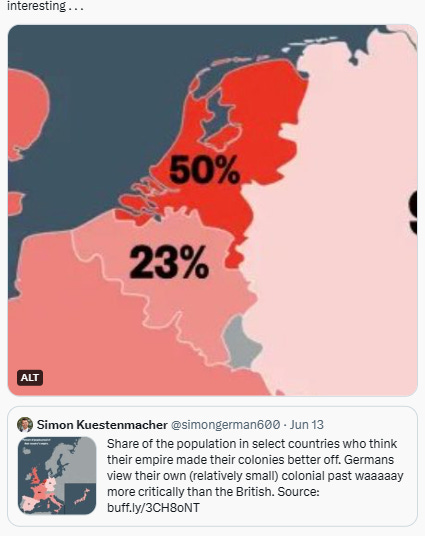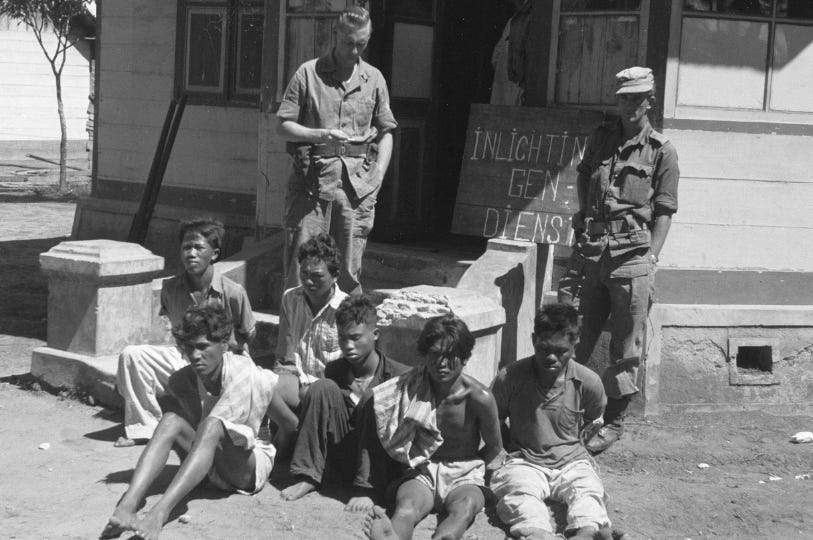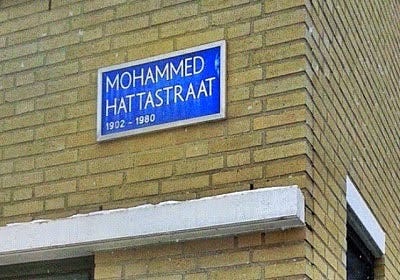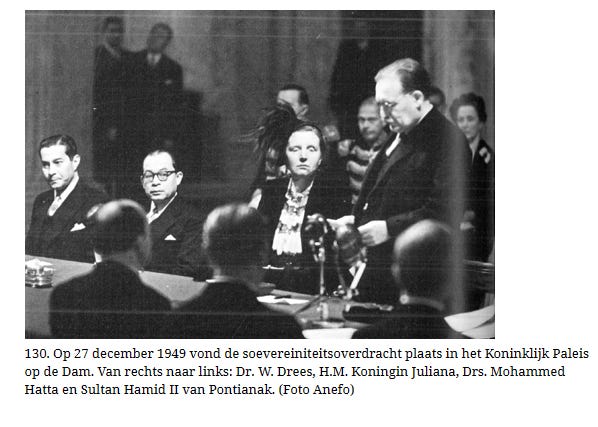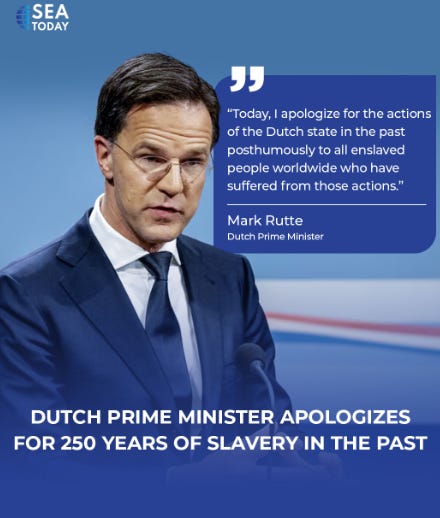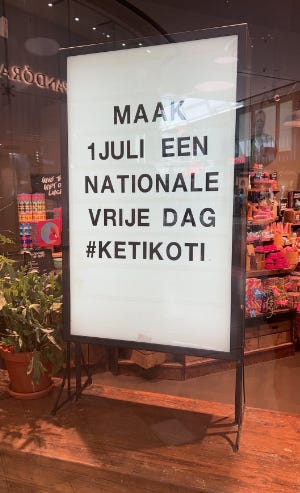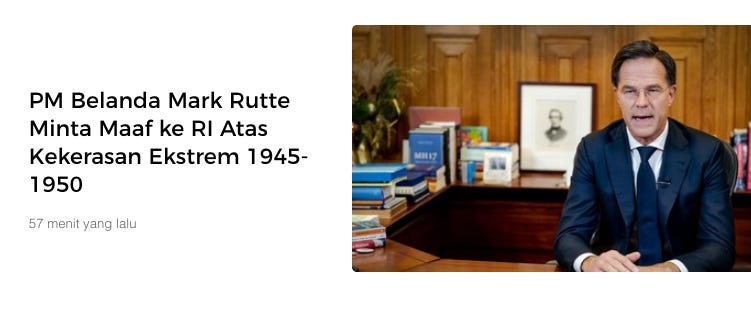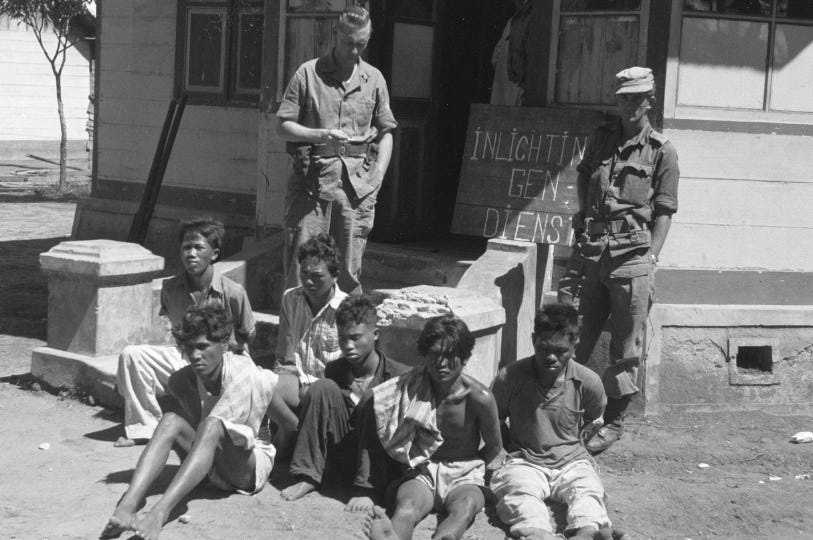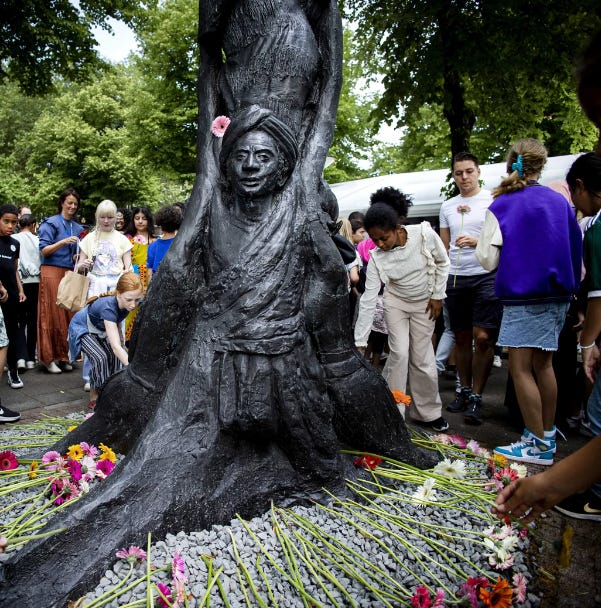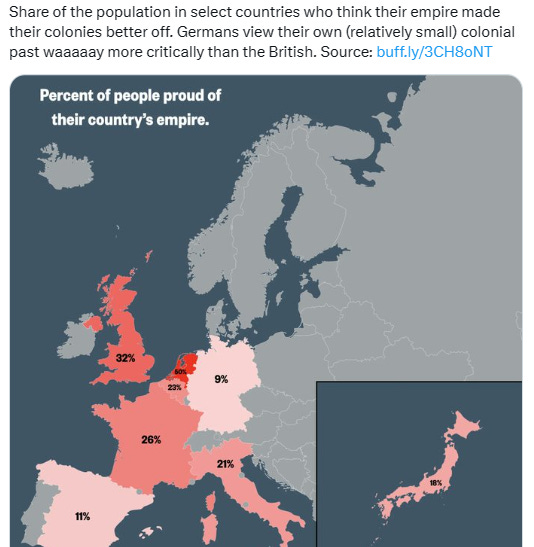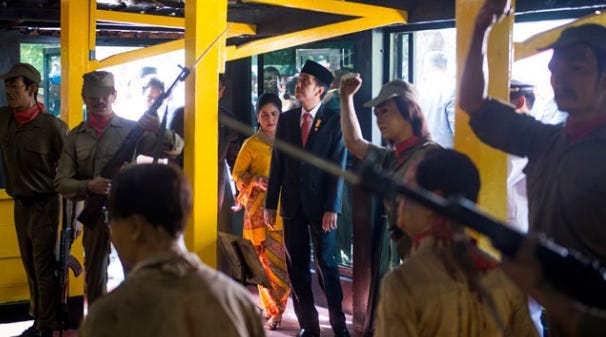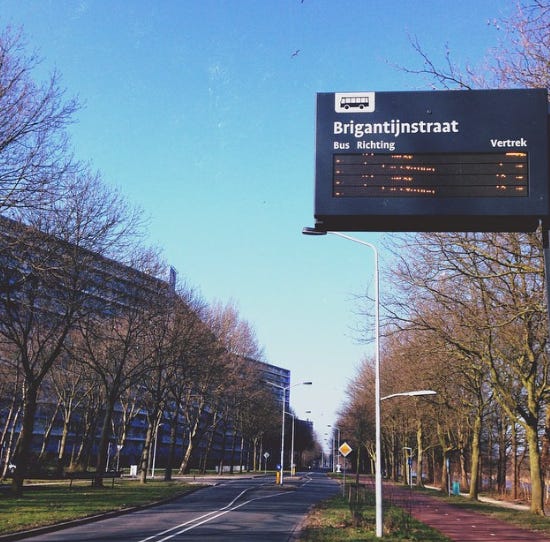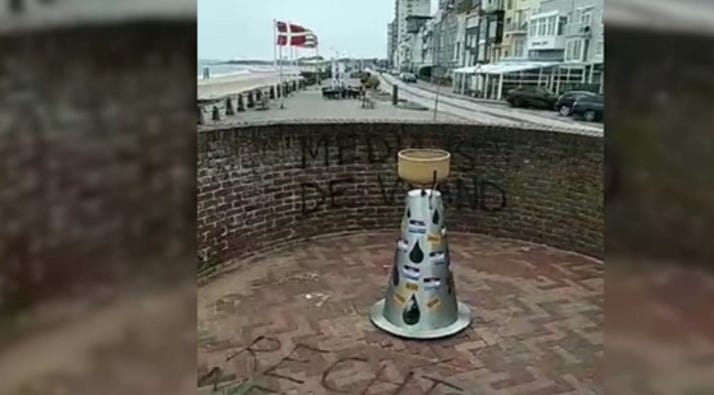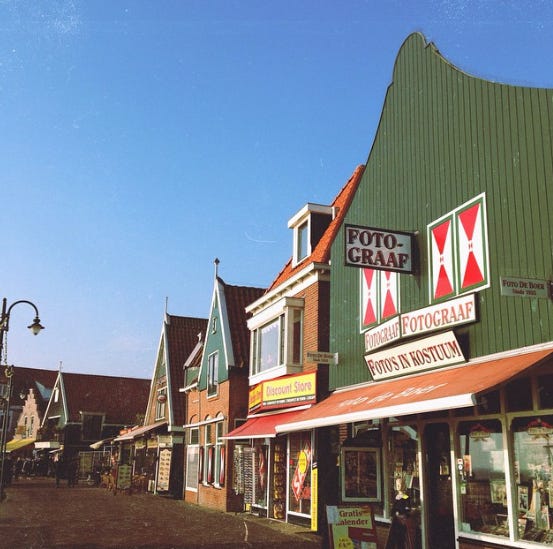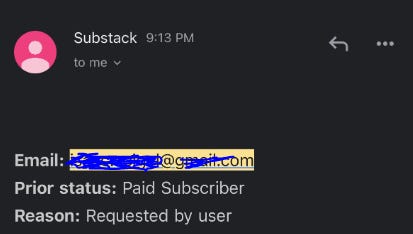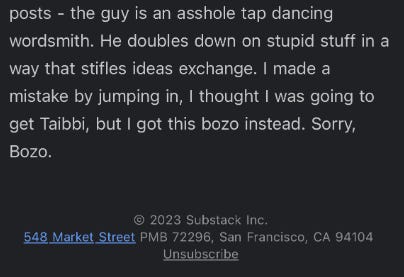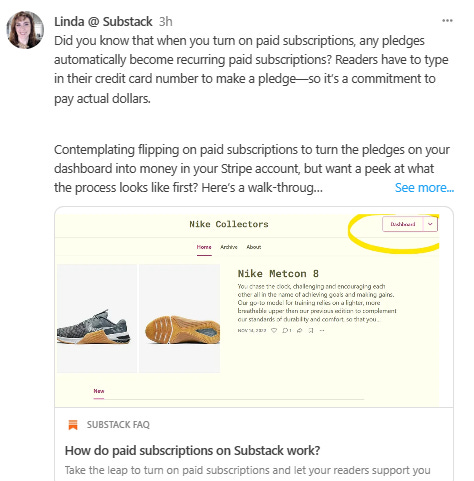Keti Koti, Indonesia's Independence Day, and (Slavery by) Dutch Brutality and Arrogance "can never forgive."
Speculation is growing that King Willem-Alexander will issue an historic apology for the Netherlands’ slave trading past when he addresses the Keti Koti commemoration in Amsterdam.
This year’s ceremony in Oosterpark marks the 150th anniversary of the abolition of slavery in Suriname and is accompanied by a festival on Museumplein where the king’s speech will be livestreamed. 1 out of 3 Suriname is Javanese, a tribe in Indonesia. Valentine 2022, “We have to accept the shameful facts.” The Netherlands’ PM Mark Rutte apologises to Indonesia after a study found the Dutch army used 'systematic and extreme violence' to regain control of its former colony. The researchers had earlier presented their findings of the study, which began in 2017 and was funded by the Netherlands as part of a broader reckoning with the country’s brutal colonial past.
Keti Koti – which means “the chains are broken” in the Surinamese language Sranantongo – has been commemorated every year in Amsterdam on July 1 since the national memorial to slavery was put up in the park in 2002. It has been a national holiday in Suriname and the Antillean islands since 1863.
Prime minister Mark Rutte formally apologised last December for the exploitation and mistreatment of people “in the name of the Dutch state” during the colonial era.
World can’t forget about Indonesia, which was brutally occupied well after slavery ended, and since 1600s get occupied by VOC. How shocking that having just been liberated from the Nazis by the Allied Forces, the Dutch went to war to prevent Indonesia from becoming an independent state —- using a huge money from Marshall Plan. Commander-General John J. Pershing must mad to the Dutch.
Violence by the Dutch military, including acts such as torture that would now be considered war crimes, was “frequent and widespread”, said historian Ben Schoenmaker of the Netherlands’ Institute for Military History, one of more than two dozen academics who participated in the study.
“The politicians responsible turned a blind eye to this violence, just as the military, civil and legal authorities. They aided it, they concealed it, and they punished it barely or not at all,” he said.
Indonesia declared independence in 1945, shortly after the defeat of the Japanese who had occupied the country during the Second World War.
But the Dutch wanted to hang onto their former colony, and sent troops to put down the independence uprising.
About 100,000 Indonesians died as a direct result of the war, with the Netherlands withdrawing in 1949.
Indonesian author and prominent journo, founder TEMPO (an Indonesia media) Goenawan Mohamad, whose father was shot to death during the 1940s revolution in Batang, Java Island, commented about the apologies from Dutch PM Mark Rutte to the people of Indonesia on those "extreme violence" or colonialism.
He said:
“I don’t remember the exact date. But looking back now, I realize that it must have been at some time in February 1948. I was seven years old. The previous night, I had heard the adults talking about something they called a “truce.” I realize now that they must have been talking about the “Renville Agreement,” which was intended to bring to an end the armed conflict between the Kingdom of the Netherlands and the Republic of Indonesia. Both sides knew that the truce could never really hold. But for one day at least, the atmosphere was peaceful. At the very least, there hadn’t been any shooting the previous night. There was a fleeting sense of relief. People were cheerful, but they was a strange sense of peace. Dutch soldiers were still roaming the streets in open jeeps, holding their rifles. At the same time, the people of our small town had begun hanging red and white flags on the doors of their houses. People even felt sufficiently confident to gather together in an open field. I went there, with my mother. Nobody seemed to be afraid. At one point, the people broke out in song, singing Tujuh Belas Agustus (“On the 17th of August”) together. It was a new revolutionary song, and only a few were familiar with it. Even so, I saw one woman, a friend of my mother’s from her time in exile in Digul, singing at the top of her voice, tears in her eyes.
But in the end, it turned out that the day was not quite as peaceful as it had seemed at the beginning.
When we got back from the celebration in the field in the late afternoon, our housekeeper, Sambyat, told us that some Dutch soldiers had stormed into the house, carrying guns. After removing the paper flags of the new Republic from our gate, a soldier had forced Sambyat to swallow two of them. Then they had left.
In the evening, Mother told me that earlier in the afternoon, the Dutch soldiers had shot dead four young men in the rice fields. There hadn’t been any fighting. “They weren’t even partisans,” my mother said.
From that moment onwards, the word “truce” took on a completely different meaning in our household.
Almost a full century later, in 2022, the Dutch Prime Minister, Mark Rutte, issued a statement on behalf of his government. “On behalf of the Dutch government, I offer my most profound apologies to the people of Indonesia for the systematic violence perpetrated upon them by our country, a violence that until now has never been fully acknowledged,” he said.
I can understand why he made the apology, but I’m not sure that he was the right person to issue it. Rutte was born in 1967, a full twenty years after Van Mook, the acting Governor General of the Dutch East Indies, had attempted to destroy the design of the new Republic and conducted acts of military aggression against its people. I am not sure that Rutte has a good grasp of Indonesian history and its intricacy. He belongs to a generation raised years after Westerling, the notorious Dutch counter-insurgency officer, ordered the execution of hundreds of “terrorists” in Sulawesi without trial, and attempted a military coup against the Indonesian government. I prefer to see Rutte’s apology not as a conscientious policy, but rather a political act or, if you will, a proxy. It is a mea culpa without pathos. After all, his government has no part in the ugly chapter of the Dutch colonial history, and he could fairly say that our entangled histories were, like other histories, a “slaughtered bench”, to borrow Hegel’s dark metaphor; and who knows where the Schlachtbank exactly was. We write history and stack up collective memories. But historiography has a fundamental flaw: it requires the use of words and names. It is based on an assumption that there is a common agreement regarding what these words and names mean: “Dutch” “Indonesianas,”, “violence.” Historians string them together to create narratives and produce a meaning about the value of human freedom. They want to believe that the words they use will generate a consensus of signification. But language is tricky. The word “Dutch” only means something if you compare it to something that is “non-Dutch” — and that is without limit. You’ll never be able to completely define what the words “Dutch” and “Indonesian” might mean. You can’t define a word by looking it up in the dictionary or in Wikipedia. Each word is perpetually elusive. Identities, names, and labels are always a process.
So I’m not saying anything new arguing that the word “Dutch” meant something different in the 1940s to what it means in 2020. The link between the government in The Hague today and Westerling — who, incidentally, tried to become an opera singer after retiring as a soldier — is entirely an abstraction.
A professor at Leiden University, who knew that the colonial regime sent my parents into an exile in Papua in the 1930s and executed my father in 1947, once asked me: “Do you still hate the Dutch?”
“I don’t think so, ” I replied, somewhat taken aback.
“I asked you because we Dutch still hate the Germans,” he replied.
The professor was a a very civil sort; it was atypical that he, speaking of Germans, used the word “hate”. But how could I assess the intensity of the pain, the humiliation, and the trauma living under Nazi’s repression?
“Our experiences are different,” I replied.
Experiences are always personal and different. Each is shaped by a finite and transitory world. I do not believe that there is any such thing as a “collective memory” recording history without blemish. This is particularly true when it comes to what may be described as “extreme violence” in the past. Every time I hear people sitting down to judge what happened in the past, I hear one line of Chairil Anwar’s poetry echoing in my head: “We — the dogs being hunted — see only fragments of the play in which we act.” Still, if anybody asks me how I feel about Rutte’s statement, I say: “Yes, I believe in forgiveness”. Despite the nature of the Dutch apology as a conceptual construct, I always remember what Monginsidi did. The young guerrila leader in Makassar forgave the Dutch soldiers before they executed him on September 5, 1949. But what do the words “systematic violence” really mean? Revolution is not a dinner party, as Mao Zedong once said; it implies ambition and murder. Neither is counter-revolutionary politics of repression. In the modern histories of China, Algeria, and Indonesia, both the revolutionaries and their enemies have their own slaughterhouses. This does not mean that everything is blurred and that there can be no judgment. To me, it is clear what the words “extreme violence” mean: they refer to colonialism itself. Colonialism is an evil institution, built on arrogance and greed, based on an “ideology” that was used to justify treating Indonesians (and many other peoples elsewhere) as less than human, as subhuman slaves.
And that is something I can never forgive.
The Dutch crimes “included mass detentions, torture, burning of kampongs (villages), executions and killing of civilians”, said Frank van Vree, a war history professor at the University of Amsterdam, during an online presentation of the research.
Dutch courts have ruled that the Hague-based government must compensate the widows and children of Indonesian fighters executed by colonial troops, and that the statute of limitations does not apply in the case of Indonesia’s struggle for independence.
Jun 20th, 2023 (11 days ago) Indonesia's former colonizer the Netherlands has recognized that Indo became independent on 17/8/45 (August 17, 1945), but the statement is deemed 'insincere,' a 'huge insult' as there'll be no legal consequences. White guilt means nothing without concrete results, basically.
Dutch PM Rutte has said that he'll discuss with Jokowi abt this latest recognition. A lot of Indonesian urged Jokowi to seek results such as visa-free access for Indonesians to the Netherlands. "have a little dignity, we are not a small nation. Indonesia has a same influence like China in entire Pacific, try mediating Russia - Ukraine."
Also the Dutch launched military offensives to Indonesia twice in 1947 & 48, which means that they invaded a sovereign country and what the Dutch troops did here could be categorized as 'war crimes' instead of 'extreme violence'.
Indonesian (like me) suffered “recolonialization” by Dutch since 1946 (thanks a huge money from Marshall Plan, so Dutch try reinvade Indonesia).
So Soekarno pushes another independence for entire Asia Africa at least since January 1950: because Soekarno doesn’t want other countries (in Asia Africa) felt gigantic suffers like Indonesia.
October 2021, UK The Observer published evidence that Britain played a part in inciting the killings. It is estimated that at least 500,000 people were murdered between 1965 and 1966 by the Indonesian army, militias and vigilantes. The UK government has always denied involvement, but the declassified documents tell a different story.
In 2020, Dutch King Willem-Alexander apologised for the “excessive violence” inflicted on Indonesia during his country’s colonial rule, which ended in 1949. 1 Week before Christmas 2022 (Dec 19th 2022, 74 years after Operation Kraai/Operation Crow, a Dutch military offensive against the de facto Republic of Indonesia in December 1948 after negotiations failed) Prime Minister Mark Rutte AC of the Netherlands formally apologized on behalf of his government for the country’s role in abetting, stimulating, preserving and profiting from centuries of slave trading, (*although not directly mentioned Indonesia as well).
“For hundreds of years, people were made of merchandise, exploited and abused in the name of the Dutch state,” Rutte said. He also said Dutch governments had not done enough to acknowledge that slavery had had lasting negative effects since it was abolished in the Dutch colonies in 1863.
“We’re not doing this just to come clean,” Mr. Rutte said. “We’re not doing this to leave history behind us.”
The run-up to (Prime Minister) Mr. Rutte’s apology was fraught, with multiple groups of descendants saying that the government had not consulted them and that the occasion lacked any significance. Descendants would not accept Mr. Rutte’s apology, partly because the government did not speak to the right stakeholders and descendants of enslaved people. More communication and a meaningful date would have made the apology more palatable, many people said.
“This apology marks a historic moment,” said Pepijn Brandon, a professor of global economic and social history at the Free University of Amsterdam who has studied 18th-century Atlantic slavery for the Dutch economy. But, he added, “they couldn’t have been prepared any worse.” The speech did not go far enough. July 1, 2022 marks 150 years since the end of slavery in the Dutch colonies, and next year was declared a national year of remembrance. Part of the reason the apology happened on Monday, Mr. Rutte said, was because he wanted to do it before the start of the official commemorations.
Geoctrooieerde Westindische Compagnie / GWC (Dutch West India Company) and Verenigde Oostindische Compagnie / VOC (Dutch East India Company) established with private and state capital and governed by Dutch state officials and, later, royalty. The Netherlands was responsible for the transport of an estimated 600,000 people over the Atlantic Ocean. And under the East India Company, the Netherlands also traded people in Indonesia, India and South Africa. From the 17th century through the 19th century, the companies enslaved more than a million people. While slavery was forbidden in the Netherlands, it was legal — and crucial to the profitable plantations — in Dutch colonies such as Brazil, Indonesia and Suriname. Even after slavery was abolished in the colonies, enslaved people were required to continue working on plantations for another decade afterward to minimize losses for the slave owners.
Whilst, this (Jokowi) acknowledgement necessitates identifying those who enabled Suharto to commit these atrocities—and how it was replicated all over the world.
Campaigners say that an apology from the king, as head of state, is seen by descendants of people enslaved in the Dutch colonies as more meaningful.
“Without taking away from the importance of the prime minister’s apologies, I think an apology from the king has great symbolic value,” Linda Nooitmeer, chair of the national institute for the study of slavery NiNsee recently told NOS.
The king has dropped hints recently that he is preparing to issue an apology. In a podcast to mark the 10th anniversary of his accession to the throne, he said the country needed to go through a “healing process” together to acknowledge the harm done during the colonial era.
“I know I’m not guilty of anything, but clearly I have a responsibility towards Dutch society for what our ancestors did,” he said.
The king also commissioned a study into the royal family’s own role in the slave trade which concluded that the house of Oranje-Nassau earned the equivalent of €545 million in today’s money from slavery, exploitation and forced labour.
Rutte and Queen Maxima are also attending the Keti Koti ceremony in the Oosterpark, along with finance minister Sigrid Kaag and Franc Weerwind, the minister for legal protection, who has Surinamese ancestry.
Several other ministers will be present at ceremonies in the Dutch Caribbean nations. Foreign affairs minister Wopke Hoekstra is in Suriname, health minister Ernst Kuipers is in Curaçao, housing minister Hugo de Jonge is on the island of Bonaire and Alexandra van Huffelen, junior minister for kingdom relations, is travelling between Sint-Maarten, Saba and Sint-Eustatius.
Two monuments to slavery are being unveiled in Utrecht and Almere, taking the total around the country to eight, while the municipalities of Middelburg and Vlissingen, which were important trading ports in the 17th century, will issue formal apologies.
An unofficial memorial was placed in Vlissingen’s harbour on Friday (June 30th, 2023) by campaigners after the municipal council refused to sanction one, arguing it would be “gesture politics”.
In the last two years year the mayors of all four major cities have apologised for their role in facilitating the slave trade, while the Dutch central bank (DNB) has published a report detailing how it was founded with capital from colonial entrepreneurs and provided financial services to slave traders.
DNB chairman Klaas Knot said it was important to make history visible and recognise the suffering that the bank’s activities caused. “The facts that emerged from the study and the deeply racist beliefs that underlie them affect us deeply,” he said.
=============
DUTCH
Moet de koning zaterdag zijn excuses aanbieden voor het slavernijverleden? Wandelaars rond zijn woning Huis Ten Bosch twijfelen. ‘Laten we dit niet zo politiek maken.’
Nederland erkent "volledig en zonder voorbehoud" dat Indonesië op 17 augustus 1945 onafhankelijk werd van Nederland. Dat heeft premier Mark Rutte gezegd in de Tweede Kamer. Op 17 augustus 1945 riep Soekarno, na de Japanse capitulatie, de onafhankelijkheid uit, maar Nederland heeft dat moment nooit officieel willen erkennen.
In 2005 zei toenmalig minister van Buitenlandse Zaken Ben Bot wel dat de onafhankelijkheid van Indonesië "de facto" al in 1945 begon, maar officieel hanteerde Nederland nog steeds de datum van 27 december 1949, toen de overdracht van soevereiniteit plaatsvond en Nederland zijn aanspraken op Indonesië opgaf.
Tussen 1945 en 1949 voerde Nederland een oorlog om de macht in de kolonie weer terug te krijgen. Onder druk van met name de Verenigde Staten moest ons land zich uiteindelijk terugtrekken.
Op vragen van GroenLinks en D66 zegde Rutte toe dat hij met zijn Indonesische ambtgenoot zal overleggen om te komen tot een gezamenlijke invulling van die onafhankelijkheidsdag. Hij wees er wel op dat hij zelf al vaak op 17 augustus aanwezig is geweest bij de viering op de Indonesische ambassade en dat de Koning al jaren op die dag een gelukstelegram stuurt naar Jakarta.
Moet de koning zaterdag zijn excuses aanbieden voor het slavernijverleden? Wandelaars rond zijn woning Huis Ten Bosch twijfelen. ‘Laten we dit niet zo politiek maken.’ Tussen de afschaffing van de slavernij en het eerste Nederlandse slavernijmonument zat bijna anderhalve eeuw. In Vlissingen namen burgers vrijdag uit protest het heft in eigen handen en plaatsen een monument op de boulevard.
De muur achter het nieuwe slavernijmonument in Vlissingen is beklad met racistische leuzen en op het monument zelf zijn stickers geplakt. Inwoners van het Zeeuwse stadje hadden het monument in de nacht van donderdag op vrijdag geplaatst. De makers doen aangifte van racisme.
Op beelden van Omroep Zeeland is te zien dat op de muur met zwarte verf "2070: blanke minderheid" is geschreven.
Ook staat er "Media is de vijand". Op de straat voor het monument staat "Rechtsstaat is mediastaat". Op het monument zelf werden stickers geplakt. Hierop staat een Nederlandse vlag afgebeeld met de tekst: "Nee tegen omvolking".
"Er is nog zo veel te leren en te weten van elkaar, als je dan in staat ben om dit te doen... wow", aldus Duijndam. "Petje af dat je iets prachtigs probeert te vernietigen door jouw eigen gedachtengoed."
Er staan onder meer bekladdingen met teksten als '2070: blanke minderheid' en 'Media is de vijand'. Ook is het monument beplakt met stickers.
"Dit is diep treurig", reageert kunstenaar Zeus Hoenderop, de maker van het monument. Hij leest een van de leuzen voor die bij het kunstwerk is aangebracht: "'Nee tegen ontvolking. Vecht tegen de vernietiging van ons ras'." Hij schudt zijn hoofd. "Volgens mij zijn we gewoon één ras en gewoon mens."
Het monument is een initiatief van voorzitter Angélique Duijndam van Keti Koti Zeeland en kunstenaar Zeus Hoenderop. Ze plaatsten het monument zonder vergunning. De gemeenteraad van de Zeeuwse stad had eerder tegen de komst van een slavernijmonument gestemd.
"Het deed me verdriet toen ik dit hoorde", zei Duijndam. "Dit geeft alleen maar aan hoe nodig het is dat we kennisnemen van wat er is gebeurd en dat we in gesprek gaan met elkaar. Samen komen we verder."
Hoenderop zegt in een reactie dat hij bij de politie is om aangifte te doen van racisme. "Dit is een dieptepunt voor onze maatschappij", zegt hij. Hij vindt dat mensen een plek moeten hebben om te herdenken dat de slavernij 150 jaar geleden werd afgeschaft. De kunstenaar vindt het heel erg dat mensen zaterdag naar die plek zijn gekomen om vervolgens te zien dat ze "worden uitgescholden".
Volgens Hoenderop is het de bedoeling dat de boel nog zaterdag wordt schoongemaakt. Het monument zelf is weliswaar beplakt met de stickers, maar is niet beschadigd en intact. De politie zei eerder zaterdag de zaak te onderzoeken.
Het monument heeft een zilveren basis, met daarop een goudkleurige kom en er zit een ketting aan, zo omschreef Duijndam vrijdag. Dat is een verwijzing naar de scheepsketting die te horen was als schepen voor anker gingen.
Een gloednieuw slavernijmonument in Vlissingen is vannacht beklad met racistische, rechts-extremistische leuzen. Het monument op de boulevard van de havenstad werd gisteren geplaatst door initiatiefneemster Angelique Duijndam. Bij Omroep Zeeland reageert zij geschokt op de bekladding.
"Dit geeft aan hoe nodig het is het slavernijverleden en de doorwerking ervan aandacht te geven", zegt ze. "Als dit dan de reactie is op een monument om eigenlijk te verbinden, dan vraag ik me af wie er polariseert."
Een meerderheid in de Tweede Kamer steunt volmondig de "diepe excuses" die het kabinet heeft gemaakt aan Indonesië voor het extreme geweld tijdens de onafhankelijkheidsoorlog tussen 1945 en 1949. Toch vinden verschillende partijen dat er nog steeds sprake is van "verkeerde beeldvorming" over de rol van de meeste Nederlandse militairen die toen dienden.
De Tweede Kamer debatteert vandaag met het kabinet over de rapporten van drie gerenommeerde onderzoeksinstituten, waaronder het NIOD, het Instituut voor Oorlogs-, Holocaust en Genocidestudies. Die concludeerden vorig jaar dat er van Nederlandse kant sprake is geweest van "structureel, excessief geweld" tijdens de dekolonisatie. Zo werden er dorpen platgebrand en mensen gemarteld en zonder proces geëxecuteerd.
Ruim 75 jaar na dato raakt het afscheid van wat toen nog Nederlands-Indië heette nog steeds een zenuw in de samenleving, en dat is in de Tweede Kamer niet anders. Verschillende Kamerleden die het woord voerden verwezen naar de ervaringen van familieleden, die in de tropen woonden of als militair dienden.
Zo raakte Roelof Bisschop van de SGP geëmotioneerd, toen hij vertelde over zijn vader, die als dienstplichtig militair getuige was van een standrechtelijke executie door een Nederlandse sergeant die volgens hem door alle oorlogshandelingen op was van de zenuwen.
"Nederland wil zich wereldwijd inzetten voor mensenrechten. Dat is alleen geloofwaardig mogelijk als we onze eigen schendingen onder ogen zien", vindt D66-Kamerlid Sjoerd Sjoerdsma. Net als de meeste andere partijen benadrukt hij dat de meeste Nederlandse militairen niets te verwijten valt.
Maar verschillende rechtse partijen vertolkten in het debat de gevoelens van veteranenorganisaties, die na het uitkomen van het rapport de onderzoekers beschuldigden van eenzijdigheid. PVV, JA21, Forum voor Democratie, Groep Van Haga en BBB vinden dat de Indiëveteranen ten onrechte in het verdachtenbankje worden geplaatst. "Ze zijn wat ons betreft helden", zei Raymond de Roon van de PVV.
Toch hebben de onderzoekers in hun rapport ook aandacht voor de oorzaken van het geweld. Ze wijzen erop dat de ongeveer 200.000 Nederlandse militairen slecht voorbereid op pad gingen en dat ze geconfronteerd werden met zwaar geweld van de kant van de Indonesiërs. Ook in de zogeheten Bersiap-periode, direct na de Japanse capitulatie, werden veel Europeanen in Indonesië slachtoffer van bloedig geweld.
Maar dat is volgens de onderzoekers geen rechtvaardiging voor het geweld van Nederlandse zijde, waar de toenmalige politiek en militaire leiding voor verantwoordelijk kan worden gehouden.
Ondanks die nuance vinden ook de regeringspartijen VVD en CDA dat de beeldvorming over de veteranen verkeerd is. VVD'er Ruben Brekelmans wil dat het kabinet zich inzet om die beeldvorming te herstellen, onder meer door gesprekken met veteranen. CDA-Kamerlid Derk Boswijk vindt dat niet alleen de Indonesiërs, maar ook de Indiëveteranen excuses verdienen.
Premier Rutte zei daarop dat zijn excuses juist ook gericht zijn aan Nederlandse veteranen die zich niet hebben schuldig gemaakt aan misdaden in Indonesië. Ze werden volgens hem met een "onmogelijke opdracht" daar naartoe gestuurd. Hij wil "met een open blik" naar de geschiedenis kijken, zeker naar dit "collectieve trauma".
Partijen als de PvdA, GroenLinks en SP vinden dat het kabinet ook expliciet moet erkennen dat de Nederlandse krijgsmacht oorlogsmisdaden heeft gepleegd. "De geschiedenis wordt geweld aangedaan als dat niet gebeurt", meent Corinne Ellemeet van GroenLinks.
Volgens het kabinet is dat niet mogelijk, omdat die term 'oorlogsmisdaad' bij binnenlandse oorlogen pas in 1949 juridisch is vastgelegd. Wel heeft het kabinet gezegd dat het geweld onder de huidige definitie als oorlogsmisdaden kan worden gezien.
D66 wil dat het kabinet meer doet om de nabestaanden van slachtoffers aan Indonesische zijde te compenseren. Volgens Kamerlid Sjoerdsma is er een lijst van 900 slachtoffers, van wie de nabestaanden in aanmerking moeten komen voor genoegdoening.
=============
GERMAN
Bei der nationalen Feier in Amsterdam wird erwartet, dass König Willem-Alexander offiziell für das Unrecht um Entschuldigung bittet. An der Veranstaltung nimmt auch Ministerpräsident Rutte teil. Er hatte bereits im Dezember im Namen der Regierung um Entschuldigung gebeten. Mitglieder seines Kabinetts wollen derweil den Gedenkfeiern in den früheren Kolonien Suriname und auf sechs Karibikinseln beiwohnen.
Am 1. Juli 1863 hatten die Niederlande als eines der letzten Länder Europas die Sklaverei offiziell abgeschafft, die Arbeit auf den Plantagen endete zehn Jahre später. Die Kolonialmacht hatte zuvor in über 200 Jahren schätzungsweise 600.000 Menschen versklavt.
==========END————
Thank you, as always, for reading. If you have anything like a spark file, or master thought list (spark file sounds so much cooler), let me know how you use it in the comments below.
If you enjoyed this post, please share it.
If a friend sent this to you, you could subscribe here 👇. All content is free, and paid subscriptions are voluntary.
————
-prada- (Adi Mulia Pradana) is a Helper. Former adviser (President Indonesia) Jokowi for mapping 2-times election. I used to get paid to catch all these blunders—now I do it for free. Trying to work out what's going on, what happens next. Arch enemies of the tobacco industry, (still) survive after getting doxed.
(Very rare compliment and initiative pledge. Thank you. Yes, even a lot of people associated me PRAVDA, not part of MIUCCIA PRADA. I’m literally asshole on debate, since in college). Especially after heated between Putin and Prigozhin.
========
Thanks for reading Prada’s Newsletter. I was lured, inspired by someone writer, his post in LinkedIn months ago, “Currently after a routine daily writing newsletter in the last 10 years, my subscriber reaches 100,000. Maybe one of my subscribers is your boss.” After I get followed / subscribed by (literally) prominent AI and prominent Chief Product and Technology of mammoth global media (both: Sir, thank you so much), I try crafting more / better writing.
To get the ones who really appreciate your writing, and now prominent people appreciate my writing, priceless feeling. Prada ungated/no paywall every notes-but thank you for anyone open initiative pledge to me.
(Promoting to more engage in Substack) Seamless to listen to your favorite podcasts on Substack. You can buy a better headset to listen to a podcast here (GST DE352306207). Listeners on Apple Podcasts, Spotify, Overcast, or Pocket Casts simultaneously. podcasting can transform more of a conversation. Invite listeners to weigh in on episodes directly with you and with each other through discussion threads. At Substack, the process is to build with writers. Podcasts are an amazing feature of the Substack. I wish it had a feature to read the words we have written down without us having to do the speaking. Thanks for reading Prada’s Newsletter.




